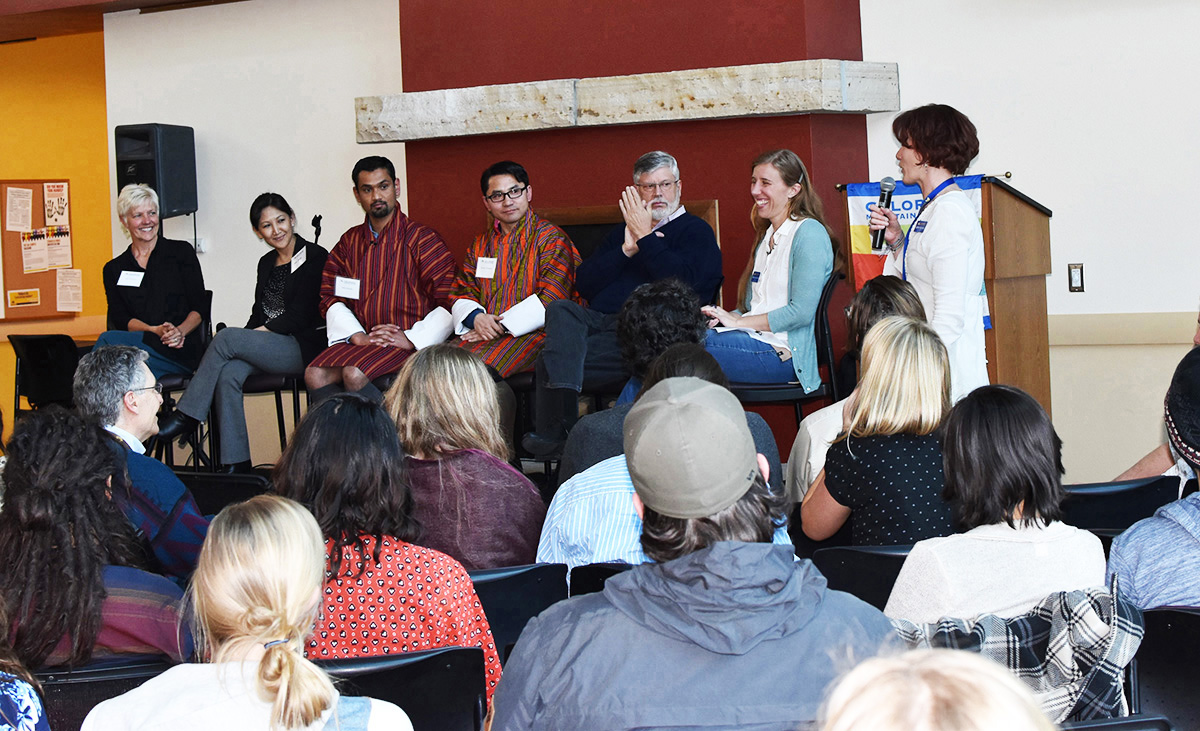
By Carrie Click
In Bhutan, a tiny country east of Nepal and surrounded by China and India, the government has implemented a new paradigm. Called Gross National Happiness, the measure of the country’s well-being is based not on how much wealth it and its citizens can accumulate, but on the principles of contentment.
At Colorado Mountain College’s 2018 Sustainability Conference, held April 19-20 at the Vail Valley campus in Edwards, during a keynote discussion a panel of speakers from Bhutan and the United States talked about Bhutan’s unique approach to environmental and cultural health.
“Gross National Happiness is not about smiles and laughter,” said Dawa Sherpa, the Bhutan Foundation’s director of programs and operations. In terms of GNH, Sherpa explained, happiness is based on contentment, and a balance of environmental conservation, cultural preservation, good governance and equitable development.
“From a Western perspective, contentment can be difficult to wrap our minds around,” said Michael Philipp, a World Wildlife Fund board member who’s one of the founders of Bhutan for Life, which is funding permanent preservation of the country’s protected areas.
Vail Valley’s turn
Every other year for the past six years, students, faculty and staff from Colorado Mountain College take a couple of days away from their regular class and work schedules to hear and interact with sustainability experts from the United States and around the world.
The conference was at CMC Steamboat Springs the previous two times. This year, it was time for CMC Vail Valley to host the event. Around 300 students, faculty and staff plus community members participated in Edwards’ conference, titled “The Sustainable ‘We’: Embracing Resilience, Inspiring Change.” Students from many different disciplines participated.
“We encourage students from all fields to attend,” said Dr. Kathryn Regjo, vice president and campus dean at CMC Vail Valley at Edwards. “This year’s conference also included students from the business program and our English as a second language students.”
In addition to the panel discussion about Bhutan, attendees could choose from over 50 sessions featuring student capstone presentations, faculty projects and discussions with staff on multiple aspects of sustainability. Topics ranged from “Sustainable transportation and Colorado economics” to “How to make your event a zero-waste one” – and a wide range in between.
Sustainability studies is a popular major at the college. Over 500 students are enrolled in these classes at the five CMC locations where a bachelor’s degree in the subject is offered: Breckenridge, Dillon, Steamboat Springs, Spring Valley at Glenwood Springs and Vail Valley at Edwards. In addition to the bachelor’s degree, students who already have a bachelor’s degree can earn a certificate of completion in sustainability leadership.
Striking a balance
Even with concerted efforts and well-educated, concerned people working to create healthy environments, challenges remain. During the Bhutan discussion at the conference, Phillips mentioned that in spite of the country’s commitment to environmental conservation. Bhutan’s economy, besides tourism, is now dependent on damming its rivers to sell hydropower to India. This has trickle-down consequences that affect fish, wildlife, added infrastructure and development.
“We have to strike a balance,” he said.
For Dr. Mercedes Quesada-Embid, a CMC Vail Valley sustainability studies professor, the discussions need to continue.
“We believe that the presentations and intellectual, interdisciplinary dialogues that took place lived up to the conference theme,” she said. “We hope that having provided the space to convene on issues of importance and reflect on our contributions to a more just society has made a memorable, motivating and meaningful imprint on the conference participants.”
